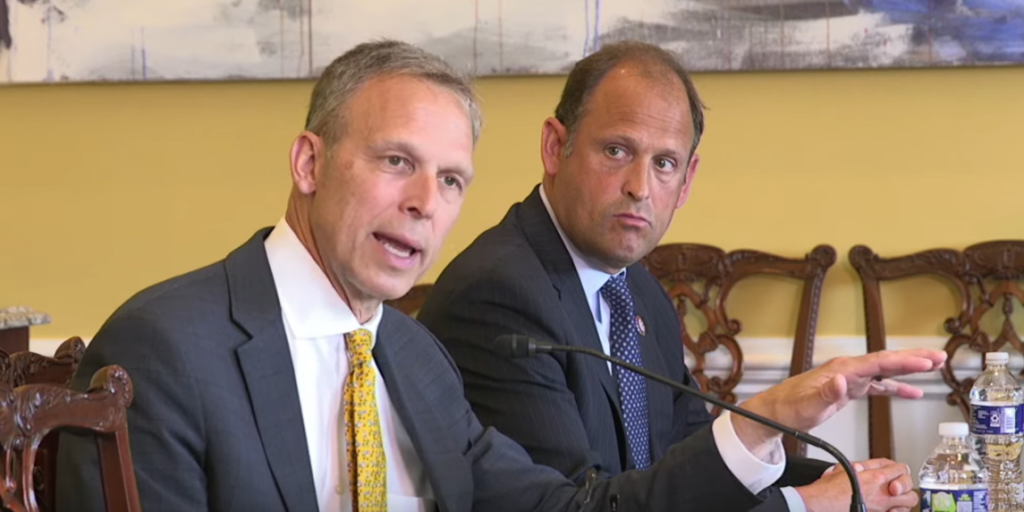After Tuesday’s shocker that President Biden would interfere in the Commerce Department’s investigation into solar product dumping by Chinese multinationals in Southeast Asia, waiving all tariffs for two years, Republicans on the China Task Force came out swinging Wednesday. Where they ultimately take their ire from herein is anybody’s guess.
“This is going to be a big agenda item for the House Foreign Affairs Committee including the Commerce’s Bureau of Industry and Security,” said Rep. Mark McCaul, chairman of the China Task Force in the House Foreign Affairs Committee. “We have to get the gavel to pass,” he said about beating the Democrats in the midterm elections in November. “Everyone in this room is ready to move forward in this direction (on China).”
CHM @RepMcCaul's statement on @POTUS welcoming illegal solar products made with slave labor
pic.twitter.com/JymnLGiPzt
— China Task Force (@China_TaskForce) June 8, 2022
On Wednesday, the China Task Force held a quick Republican Roundtable on China and Export Control. Emotions were high following Biden’s emergency Executive Order to open the floodgates to Chinese multinational solar manufacturers after weakening the Section 201 solar safeguard tariffs already in February. This was the final blow. All that is needed now is the removal of anti-dumping/countervailing duties and Section 201 tariffs on mainland China solar.
See the one-hour long China Task Force meeting here .
High on the agenda were export controls of high-tech items being shipped to Chinese tech giants, even if they are on the Entity List — a list of companies that require U.S. suppliers receive special permission before selling them computer equipment.
“The most effective way to deal with this economic competition aligned with the Chinese military is through export control. But less than 1% of all U.S. exports to China even need a license and those that do…most of those products are approved for sale anyway,” lamented Rep. Andy Barr (R-KY-6).
Rep. Barr said that the Department of Commerce, led by Gina Raimondo, the former Rhode Island governor who is rumored to be the next Treasury Secretary, does a poor job enforcing trade laws.
Chinese companies like Huawei are on the Entity List and have created spin-off companies like their smart phone company called Honor and use that as a way around the trade restrictions. China state-owned chipmaker and Apple partner YMTC has unrestricted access to U.S. tech, and U.S. computer hard-drive maker Seagate is still sending equipment to Huawei with ease, the Republicans on the Task Force said.
Commerce has the final say over export controls, even though a similar restrictions list was produced by the Defense Department. The two lists should be harmonized, Rep. McCaul said.
Meanwhile, enforcing existing restrictions is next to impossible.
“We only have 9 export enforcers around the world and two of them are in China. We have no real manpower to see if those export controls are being circumvented. We have no way to know if China companies are abiding by our trade laws,” said Daniel Markus, a staff member on the House Foreign Affairs Committee who covers China, non-defense export controls, foreign investment screenings, and trade.
McCaul said the U.S. should not be “exporting technology that helps China build its military apparatus. We spend too much on business and not a lot on security. If we don’t change that today, we are going to lose that 100-year marathon (with China).”
A week prior to the Biden administration giving China more control over America’s solar market, the Federal Thrift Investment Board, which oversees the retirement plans of government and military employees, said it would allow for investments in China.
Rep. Barr called the capital issue even more significant than export controls. “We believe this issue is the most significant. Americans are financing the rise of the CCP and the Peoples Liberation Army through investments in state-owned enterprises,” Barr said. “You’re investing in them in Western index funds, in ETFs. We have a bill that’s not part of USICA and COMPETES (Senate and House “China bills”) that will use Treasury sanctions to process and identify more CCP entities to signal to the market that they are off-limits,” he said about the Chinese Military and Surveillance Companies Sanctions Act (H.R. 5326), introduced to the House Financial and Foreign Service Committees on September 22, 2021. “We need to stop the flow of Western capital into these companies. They should not have access to our capital markets.”
Also on Wednesday, in a separate event hosted by the American Council for Capital Formation, House Ways and Means Committee Chairman Earl Blumenauer (D-OR-3) criticized the lackluster enforcement of U.S trade rules.
“American companies need the assurances that other countries play by the rules,” Blumenauer said. “We need to enforce our trade agreements in an even-handed and thoughtful way. People have the right to demand that when we make trade commitments, we follow through on them. Our record is troubling,” he said. “There is no reason we can’t follow through on improving labor conditions, environmental conditions, and make sure that everyone is playing by the same rules.”












